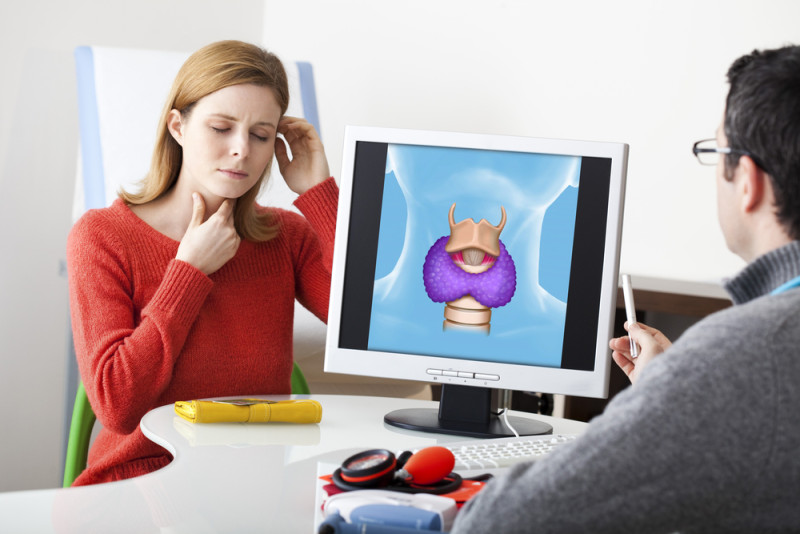If we are ill, we may take medication, but we continue. This, in my opinion, is particularly true for my spouse and me. When I'm sick, I finish all of my tasks and go to bed an hour earlier than usual. My spouse spends the entire day sleeping when ill.
Many women will ignore minor changes to their bodies or blame them on age, stress, or seasonal allergies … that last year-round, which could be detrimental to health.

One gland that influences many body systems is the thyroid gland. It is located in the neck and is responsible for directing many of the body’s functions.
The primary function of your thyroid gland is to secrete thyroid hormones, which are responsible for controlling your body’s metabolism. The 2 main thyroid hormones are T3 (triiodothyronine) and T4 (thyroxine)…The thyroid hormones are involved in regulating many of your bodily functions, such as your heart rate, how quickly you burn calories and digestion.(Source)
One can suffer from either hyperthyroidism or hypothyroidism. Hyperthyroidism is where too much of the thyroid hormone is secreted, and hypothyroidism occurs when there is too little.
Here are little-known signs of both hyperthyroidism and hypothyroidism.
1. Mood Changes

The state of the thyroid can impact on a person’s mood. Those with hypothyroidism may experience fatigue or depression, and hyperthyroidism tends to create feelings of anxiety, restlessness, nervousness, and irritability. (Source) These little changes can also be explained away by stress, and that is what most women will think it is.
2. Constipation

If someone is suffering from chronic constipation that they cannot kick, it may be a sign of hypothyroidism. There may not be enough hormones in the body to move digestion along at a proper speed. Thus, constipation. (Source)
On the other hand, those with hyperthyroidism will have increased bowel movements. (Source)
3. Changes in Sleep

Hypothyroidism makes a person feel sluggish, and this is especially true in the morning. Waking up in the morning is hard for everyone (except my kids), but if one has to struggle daily just to get out of bed, they may want to be checked for hypothyroidism.
On the hyperthyroidism side, people who suffer from this condition will often find it hard to sleep even the littlest bit at night. This may be because the thyroid is stimulating the nervous system. (Source)
4. Hair Loss and Dry Skin

Hair loss and dry skin can be a sign of both hypo and hyperthyroidism. The thyroid controls sweating and hair growth, and when hormones are thrown off balance, our skin and hair pays the price. (Source)
One interesting fact is that hairdressers will catch hair loss before the customer does, and especially before their doctor. We should be getting our hair cut once every three months, which makes your hairdresser the number one authority on the health of your hair.
“Lots of my patients come in and tell me that their hairdresser sent them,” says Dr. Robin Miller, co-author of The Smart Woman’s Guide to MidLife & Beyond. “They’ll say, ‘My hair stylist said I’m losing my hair, and I needed to go ask my doctor about my thyroid.’ The hair salons are more aware of thyroid problems than some doctors!”
5. Weight Change

This is another symptom that is at opposite ends of the spectrum for both thyroid disorders. Those with hypothyroidism will gain weight and find it tough to lose it. Those with hyperthyroidism will lose weight unexplainably. This is because the thyroid controls metabolism. Hyperthyroid equals a faster metabolism and hypothyroid means a slower metabolism. (Source)
6. Decreased Libido

Hypothyroidism may be the cause for low sexual interest in women. However, research in this area is significantly lacking.
According to WebMD, nurse practitioner, Lynn Moyer at the Marshfield Clinic Center for Sexual Health states that she has “ … seen no published studies evaluating the frequency of thyroid disease in women with sexual dysfunction issues. This is not surprising, she adds, because the serious study of female sexual dysfunction is only a few years old.”
7. Tight Muscles or Muscular Pain

One symptom of hypothyroidism is random muscle aches or cramps. These are not pains associated with a new workout or a minor accident, but pains that cannot be explained. This all has to do with the relationship between the thyroid and the nervous system. A lack of the thyroid hormone can cause damage to the nervous system which may lead to random muscle pain. (Source)
8. Heart Problems

Those with hyperthyroidism may experience a faster heartbeat. In other words, one may be relaxing, but the heart will be beating as if she were running a marathon. It is the opposite for those with hypothyroidism. The heart will commonly beat slower than normal in these individuals. (Source)
9. Brain Fog

Those suffering from hyperthyroidism may find it harder to concentrate while those with hypothyroidism will find themselves more forgetful. (Source) Again, this all has to do with the amount of thyroid hormone making its way to the brain.
10. Blood Pressure

Those with early stages of hypothyroidism will experience low blood pressure. However, if left untreated, waste will build up in the blood and blood pressure may increase to dangerously high levels. (Source) High blood pressure should be looked at carefully regardless.
Any of these symptoms could be due to an improper functioning thyroid gland. See a healthcare professional if you feel like something may be wrong with your thyroid. There are many different treatment options available.
Anyone you know have thyroid issues?
Share your story in the comments!
(h/t: Health.com) via davidwolfe.com
